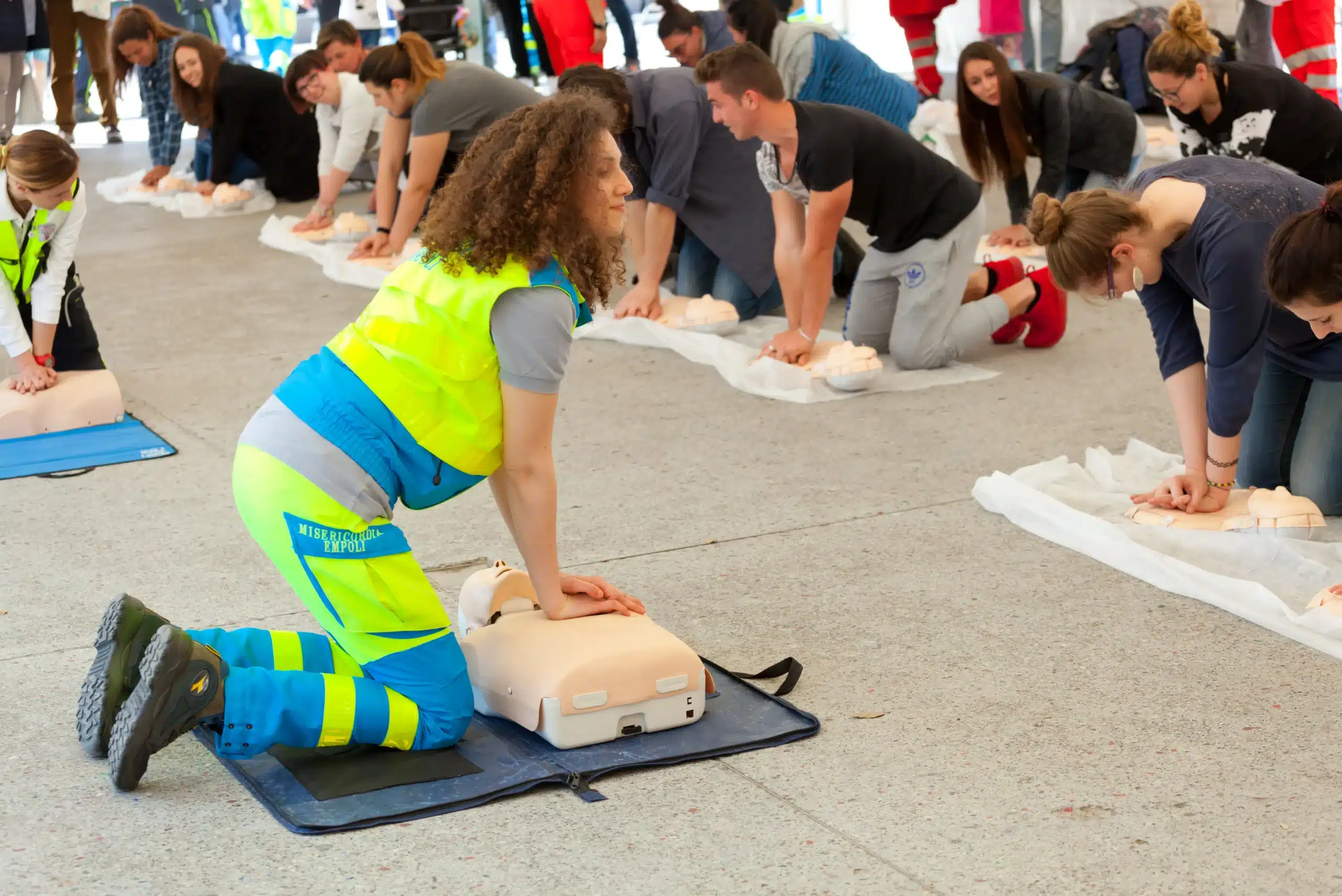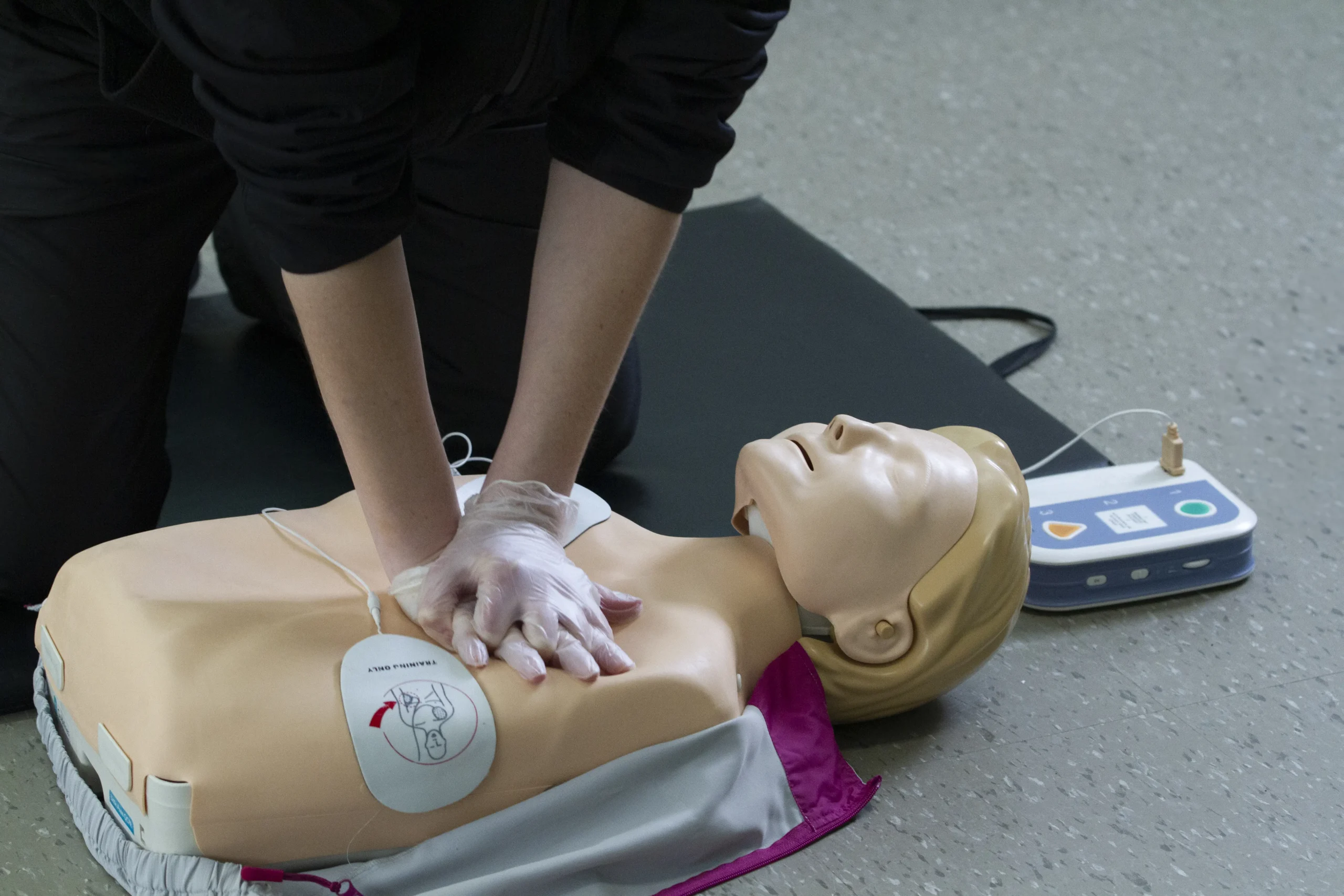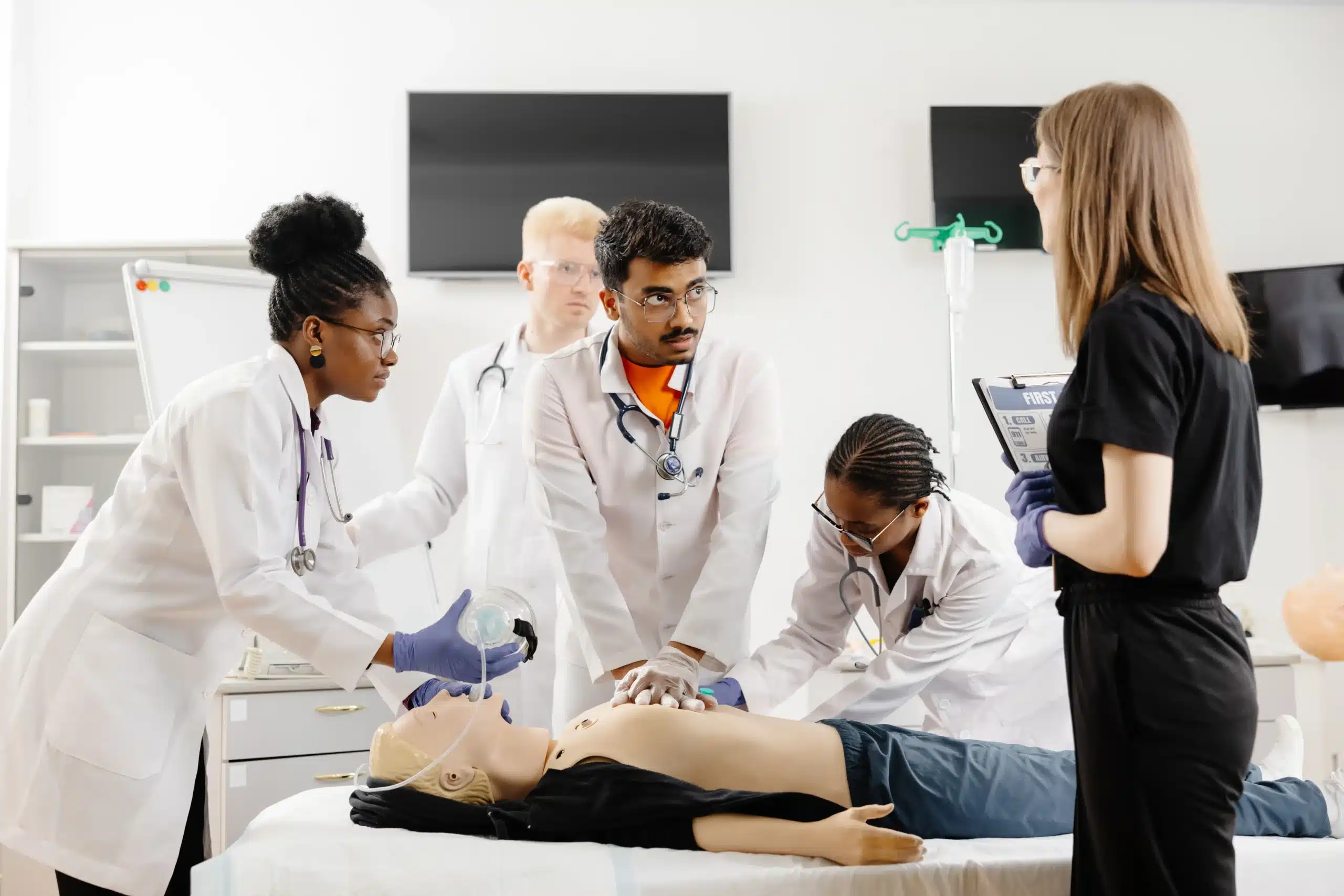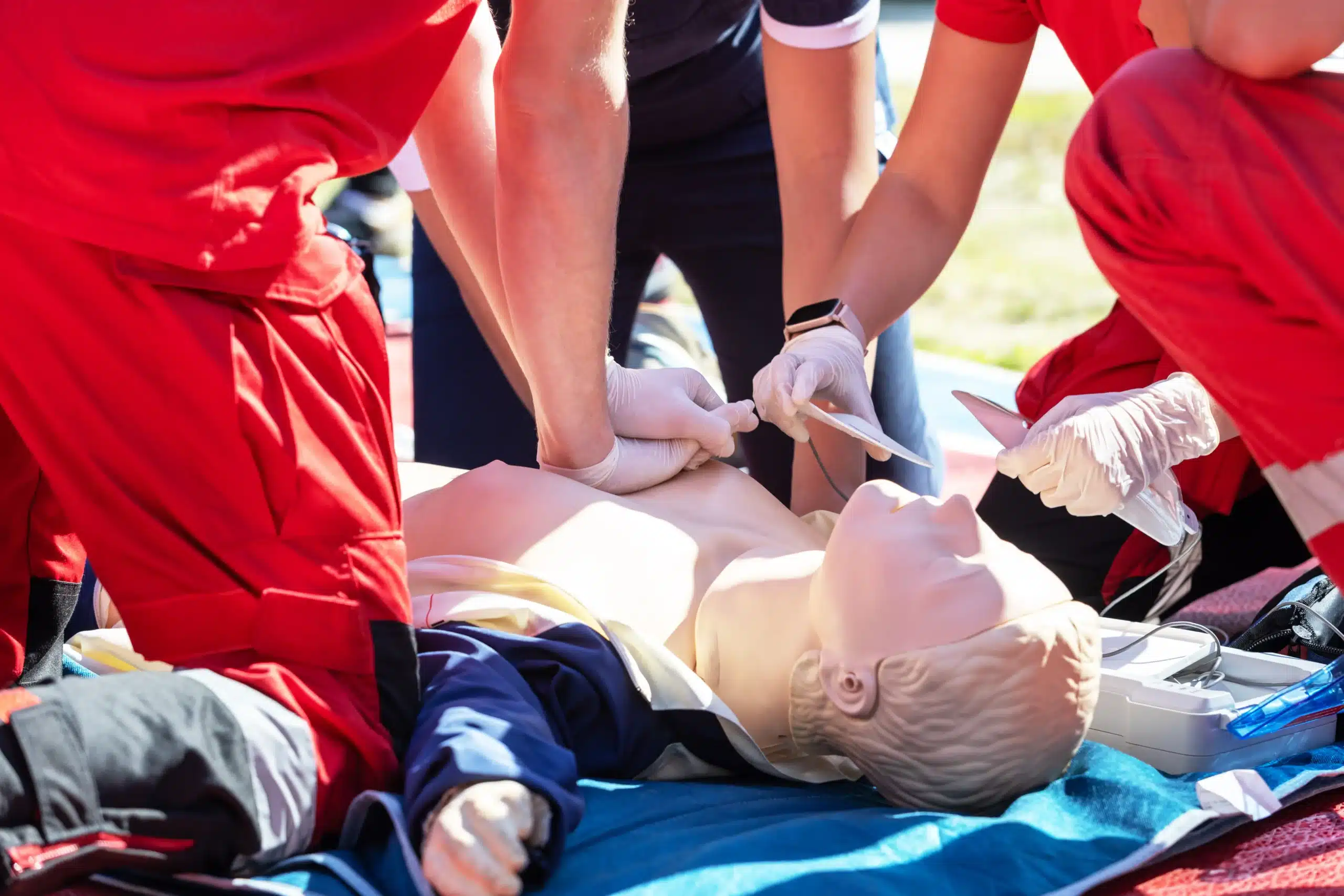As a healthcare provider or first responder, you know that staying current with your Basic Life Support (BLS) certification is non-negotiable. It’s the foundation of effective patient care in emergencies. But juggling a busy schedule with the demands of recertification can be tricky. That’s why finding a convenient and high-quality “BLS renewal near me” is essential. This article breaks down everything you need to know about BLS renewal, from understanding the latest American Heart Association (AHA) guidelines to choosing the right course format and provider. We’ll also explore the benefits of staying certified, the different types of BLS renewal courses available, and how to make the most of your recertification experience. Whether you’re in Sacramento, Roseville, Rocklin, or anywhere else, this guide will help you find the perfect BLS renewal course to fit your needs.
Key Takeaways
- Stay current with life-saving skills: BLS renewal keeps your skills sharp and ensures you’re prepared for emergencies. Choose a course format—in-person, online, or blended—that works for you.
- Select a reputable BLS provider: AHA accreditation, qualified instructors, and comprehensive materials are key. Consider location, cost, and student reviews when making your decision.
- Make the most of your training: Prepare for your course, engage actively in the learning process, and practice regularly to maintain confidence and proficiency in your BLS skills.
What is BLS Renewal & Why is it Important?
Basic Life Support (BLS) renewal keeps your life-saving skills sharp. It’s how healthcare providers, emergency responders, and other certified professionals stay up-to-date on the most effective techniques. BLS certification is typically valid for two years. Renewing before it expires is essential—there’s no grace period. A lapsed certification could hinder your ability to respond effectively during a crisis.
Why is staying current so important? BLS renewal ensures you’re familiar with the latest resuscitation practices, from high-quality chest compressions and rescue breaths to using an AED. These skills directly impact the quality of care you provide in an emergency. This article on BLS renewal highlights how crucial updated techniques are for positive outcomes. Renewing also boosts your confidence in assessing emergencies and determining when BLS is necessary, potentially saving lives. The benefits of recertification go beyond individual competency; they contribute to a stronger emergency response system. When healthcare providers maintain their BLS skills, the whole community benefits. Experts emphasize that consistent BLS recertification is key to maintaining high standards of care.
Find the Right BLS Renewal Course
Finding the right BLS renewal course involves understanding your options and what best fits your needs. Let’s break down a few key considerations: location, learning style, and course format.
Safety Training Seminars (Sacramento)
If you’re in the Sacramento area, Safety Training Seminars offers convenient and affordable BLS renewal courses right here in the city. We pride ourselves on providing high-quality, hands-on training that will give you the confidence to use your skills effectively. Our central location makes us easily accessible for those living in Sacramento, Roseville, and Rocklin. We understand that your time is valuable, so we’ve designed our courses to be efficient and comprehensive, covering all the essential BLS content. Check out our low price guarantee for the best value in the area.
Other Local Options
Beyond Safety Training Seminars, you have other options for BLS renewal. When evaluating local providers, consider a few key factors. First, check if they offer American Heart Association (AHA) certification, which is widely accepted as the gold standard in CPR training. Next, think about your learning style. Do you prefer in-person instruction or online learning? Finally, compare costs, being sure to factor in any extra fees or materials. Some providers may offer group discounts, so be sure to ask!
Online BLS Renewal
Online BLS renewal courses offer a flexible way to update your certification. They allow you to learn at your own pace and from the comfort of your home. However, keep in mind that the AHA requires an in-person skills assessment component for BLS certification or recertification. So, while the coursework itself might be online, you’ll still need to demonstrate your skills in person to a certified instructor. This blended learning approach combines the convenience of online learning with the crucial hands-on practice necessary for effective BLS. You can find more information on our website about RQI classes and other options.
BLS Renewal Course Formats: Which One Suits You?
Choosing the right BLS renewal course format depends on your learning style, schedule, and preferences. Let’s break down the pros and cons of each option so you can make the best decision for your needs.
In-Person Courses: Pros & Cons
In-person BLS renewal courses offer hands-on training and direct interaction with an instructor. This format is ideal for those who learn best through tactile experiences and value real-time feedback. You’ll practice essential skills like CPR and AED use in a controlled environment, ensuring you’re prepared for real-world emergencies. The American Heart Association (AHA) requires an in-person skills assessment for BLS certification or recertification, making this format a must. Find convenient, local BLS classes in your area. However, in-person courses may require more time and travel, which can be inconvenient for busy professionals.
Online Courses: Pros & Cons
Online BLS renewal courses offer flexibility and convenience. You can learn at your own pace and on your own schedule, making them a great option if you’re juggling work, family, or other commitments. Online courses can also be more affordable than in-person options. However, some individuals may find that online learning lacks the hands-on practice necessary to feel truly confident in their skills. While online courses can effectively deliver information, they may not fully replicate the experience of performing CPR on a manikin or using an AED in a simulated emergency.
Blended Learning
Blended learning combines the best of both worlds. This approach typically involves completing the cognitive portion of the course online, followed by an in-person skills assessment session. This allows you to learn the material at your own pace and then demonstrate your skills to a certified instructor. Blended learning offers a good balance of flexibility and hands-on practice. Many providers offer this combination of online and in-person training, catering to different learning styles and schedules.
BLS Renewal: Requirements & Process
Keeping your Basic Life Support (BLS) certification current is essential for any healthcare professional. But navigating the renewal process can sometimes feel a little confusing. This section breaks down the requirements, provides a step-by-step guide, and answers common questions about BLS renewal.
American Heart Association Guidelines
The American Heart Association (AHA) sets the standards for BLS certification and requires an in-person skills assessment, even if you complete the cognitive portion online. This hands-on component ensures you can confidently perform life-saving techniques in real-world emergencies. Safety Training Seminars follows these AHA guidelines meticulously, giving you the most up-to-date and comprehensive training.
How Long is My Certification Valid?
Your AHA BLS certification is valid for two years. You can renew up to 30 days after the expiration date, offering a grace period for busy schedules. However, it’s always best to plan and renew before your card expires to avoid any lapse in your credentials. Check your certification card to confirm your expiration date.
Renew Your BLS Certification: A Step-by-Step Guide
Renewing your BLS certification is straightforward. Here’s a simple guide:
-
Locate your expiration date: Find this on your current BLS certification card.
-
Choose a renewal course: Select a course that fits your schedule and learning style. Safety Training Seminars offers various options, including in-person and blended learning formats. We also offer a low price guarantee.
-
Complete the course: This involves studying the latest BLS guidelines, practicing essential skills, and successfully completing any required assessments.
-
Receive your updated certification card: Once you’ve passed the course, you’ll receive a new card, valid for another two years. Keep this in a safe place and mark your calendar for your next renewal.
BLS Renewal Costs: What to Expect
Knowing the cost of BLS renewal and available discounts helps you budget effectively. Let’s break down typical expenses and potential savings.
Average BLS Renewal Course Prices
BLS renewal course prices vary based on location, course format (online, in-person, or blended), and the training provider. In Sacramento, expect to pay anywhere from $50 to $90 for a renewal course. This price typically includes the course materials, skills testing, and your certification card.
Discounts & Deals
Many training centers offer discounts, especially for groups, students, or returning customers. Check with your employer to see if they offer discounts or reimbursements for professional development courses like BLS renewal. Some providers also offer discounts for registering early or bundling courses. Searching online for “BLS renewal discounts” can reveal potential savings. Safety Training Seminars offers a low price guarantee for BLS renewal courses in Sacramento County.
Safety Training Seminars’ Low Price Guarantee
Safety Training Seminars offers competitive pricing for BLS renewal in Sacramento, Roseville, and Rocklin. Our low price guarantee reflects our commitment to providing high-quality, affordable training. If you find a lower advertised price for a comparable BLS renewal course in Sacramento County, we’ll match it. Visit our BLS course page for more information.
How to Choose a BLS Renewal Provider
Picking the right BLS renewal provider is key to a smooth and valuable recertification experience. Here’s what to consider:
Accreditation & Reputation
First things first, check if the provider is accredited by a trusted organization like the American Heart Association (AHA). AHA certification ensures your training aligns with the latest evidence-based guidelines. A strong reputation matters, too. Look for providers known for quality instruction and up-to-date materials. Consider checking with colleagues or other healthcare professionals for recommendations.
Instructor Qualifications
Experienced instructors make all the difference. Find out about their background and certifications. Do they have real-world experience? Are they passionate about teaching? Safety Training Seminars, for example, highlights the importance of hands-on training in their BLS courses. This practical approach can boost your confidence and skill retention. Look for providers who prioritize experienced and qualified instructors.
Course Content & Materials
Make sure the course content covers everything required for BLS renewal, including adult, child, and infant CPR, AED use, and relief of choking. While online renewal options offer flexibility, remember that the AHA mandates an in-person skills check for certification. Learn more about online vs. in-person BLS renewal options. A good provider will offer comprehensive training that meets these standards and provides high-quality materials.
Student Reviews & Testimonials
What are other students saying? Reading reviews and testimonials can give you a feel for the provider’s strengths and weaknesses. Look for comments about the quality of instruction, the helpfulness of the materials, and the overall learning experience. Positive feedback from past students can be a strong indicator of a worthwhile course. For instance, students often share their experiences with different programs, highlighting aspects like value and affordability. Reading these reviews can offer valuable insights and help you make an informed decision.
Get the Most Out of Your BLS Renewal
Getting recertified in Basic Life Support (BLS) isn’t just a checkbox; it’s a chance to refresh crucial skills and boost your confidence in emergencies. Here’s how to make the most of your BLS renewal:
Prepare for Your Renewal Course
Before you sign up for your BLS renewal course, take a few minutes to think about your learning style and needs. Do you thrive in a hands-on, in-person environment, or do you prefer the flexibility of online learning? Consider factors like your schedule, budget, and the provider’s reputation. AHA certification is the gold standard, so look for a training center with current AHA guidelines like Safety Training Seminars. Also, don’t forget to ask about potential group discounts or explore options for more affordable CPR and first-aid certification.
Make the Most of Interactive Learning
BLS skills require practice. While online courses offer convenient self-paced learning, the American Heart Association (AHA) requires an in-person skills check for certification. Look for a renewal course that balances online learning with hands-on practice. Safety Training Seminars offers this blended approach, giving you the best of both worlds. You’ll get the flexibility of online learning combined with the essential hands-on training component.
Use Your BLS Skills in Real-World Situations
Think of your BLS recertification as an investment in your ability to respond effectively during emergencies. Regularly practicing your skills—even after you’re certified—will help you stay sharp and confident. Consider volunteering at community events or finding opportunities to share your knowledge with others. Ultimately, staying up-to-date on BLS techniques can make all the difference. It reinforces best practices for high-quality chest compressions, and helps you quickly assess when someone needs BLS. This preparation can significantly increase the chances of a positive outcome in a real-life emergency.
Related Articles
- Quick & Easy BLS Renewal in Sacramento – Sacramento CPR Classes
- BLS Classes in Sacramento: Your Complete Guide – Sacramento CPR Classes
- OSHA-Approved BLS Certification: A Comprehensive Guide – Sacramento CPR Classes
- BLS Certification Sacramento: A Guide for Healthcare Providers – Sacramento CPR Classes
- BLS Certification in Sacramento: Your Complete Guide – Sacramento CPR Classes
Frequently Asked Questions
How often do I need to renew my BLS certification? BLS certification through the American Heart Association is valid for two years. Plan to renew within that timeframe to maintain your credentials. Some providers offer a short grace period, but it’s always best to renew before your card expires.
What’s the difference between online and in-person BLS renewal courses? Online courses offer flexibility, allowing you to learn at your own pace and often at a lower cost. However, the AHA requires an in-person skills assessment, so even with online learning, you’ll need a hands-on component. In-person courses provide direct interaction with an instructor and real-time feedback, which many find beneficial for mastering the techniques. Blended learning combines online coursework with an in-person skills session.
How much does BLS renewal typically cost? Costs vary depending on location, provider, and course format. Expect to pay between $50 and $90 in Sacramento. Look for providers offering discounts, such as Safety Training Seminars’ low price guarantee, or check with your employer for potential reimbursement.
What should I look for when choosing a BLS renewal provider? Choose a provider accredited by the AHA to ensure your training meets the latest guidelines. Consider instructor qualifications, course content, and student reviews. A provider with a solid reputation and experienced instructors will offer a better learning experience.
How can I make the most of my BLS renewal? Prepare by considering your learning style and choosing a course format that suits you. Engage actively during the course, whether online or in-person, and take advantage of opportunities to practice your skills. Consider how you can use your renewed skills in real-world situations, such as volunteering or sharing your knowledge with others.








